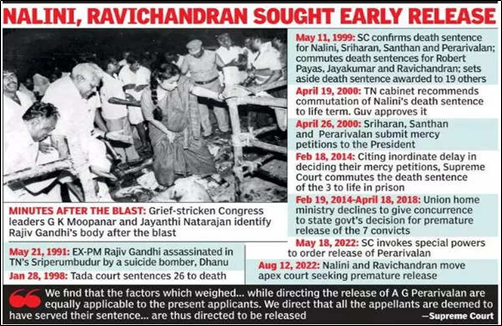In News:
- The Supreme Court has set free the remaining six convicts in the Rajiv Gandhi assassination case, extending to them the benefit of its order releasing their co-convict A G Perarivalan.
- Rajiv Gandhi was assassinated on the night of May 21, 1991 at Sriperumbudur, Tamil Nadu.
- Fifteen others, including nine policemen, were also killed in the attack and 43 others injured.
What’s in today’s article:
- Background (Rajiv Gandhi case, A G Perarivalan release)
- Article 142 and Article 161 of the Constitution
- News Summary
Background:

- In 2014, the Supreme Court had commuted the death sentence of AG Perarivalan, one of the convicts in the Rajiv Gandhi assassination case, to life imprisonment on account of the undue and unexplained delay in deciding his mercy plea.
- Subsequently in 2018, Perarivalan submitted an early release application to the Governor (Tamil Nadu) under Article 161 of the Constitution.
- The then Governor of Tamil Nadu decided to refer the plea to the President of India.
- The Tamil Nadu government objected to such ‘reference’, which has no statutory or constitutional validity.
- Both, Perarivalan and the Tamil Nadu government, in 2018, approached the Supreme Court due to the delay in his release, despite a recommendation given by the then Tamil Nadu government to remit his sentence.
Supreme Court’s Judgement in May, 2022:
- In May 2022, the Supreme Court ordered the release of AG Perarivalan, invoking powers under Article 142 of the Constitution.
- The court was of the view that the inordinate delay in deciding Perarivalan's early release plea by the Governor under Article 161 warranted his release.
- The court observed that the inordinate delay by the Tamil Nadu Governor in exercising his powers under Article 161 can be subject to judicial review.
- The court opined that the state government is well-within its authority to aid and advise the Governor in pardon/remission pleas pertaining to cases of murder.
About Article 142 of the Constitution:
- Article 142 provides a unique power to the Supreme Court, to do “complete justice” between the parties, where at times law or statute may not provide a remedy.
- In those situations, the Court can extend itself to put a quietus to a dispute in a manner that would fit the facts of the case.
- The necessity for incorporating such an article into the Constitution was spelt out in the Constituent Assembly.
- The framers of the Constitution felt that this provision is of utmost significance to those people who have to suffer due to the delay in getting their necessary reliefs due to the disadvantaged position of the judicial system.
Important instances where the Supreme Court exercised its powers under Article 142:
- Manohar Lal Sharma v. Principal Secretary:
- The Supreme Court can deal with exceptional circumstances interfering with the larger interest of the public in order to fabricate trust in the rule of law.
- Union Carbide Corporation v. Union of India:
- In Bhopal Gas Tragedy Case, the court ordered to award compensation to the victims and placed itself in a position above the Parliamentary laws.
Article 161 of the Constitution:
- Under Article 161 of the Constitution, the Governor of a state possesses the pardoning power.
- A Governor can grant pardons, reprieves, respites and remissions of punishment or suspend, remit and commute the sentence of any person convicted of any offence against a state law.
- The advice of the state cabinet is binding on the Governor in matters relating to commutation /remission of sentences under Article 161.
- Also, the orders passed by the Governor, under Article 161, can be subjected to judicial review.
News Summary:
- The Supreme Court directed the premature release of six convicts serving life term in the assassination case of former Prime Minister Rajiv Gandhi.
- The Court also noted that the six had spent over three decades in jail in the case and said that their conduct was satisfactory in this period during which they had pursued studies as well.
- Two-judge bench of the Supreme Court said the judgement of the top court in the case of A G Perarivalan, one of the convicts in the case, is equally applicable in their matter.









